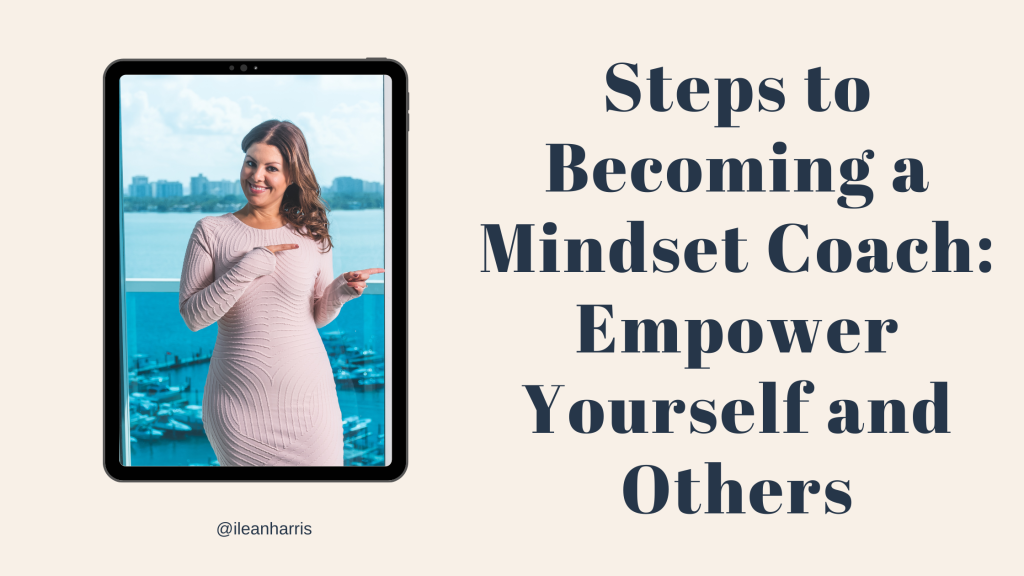This post is all about mindset coach.

Hey there, aspiring mindset coach! Are you ready to embark on a journey that can empower not only yourself but also others?
If you’re passionate about personal development, helping people break free from limiting beliefs, and unleashing their full potential, then becoming a mindset coach might be the perfect path for you.
In this comprehensive guide, we’ll explore the steps to becoming a mindset coach, offering insights, tips, and real-world advice to help you get started on this fulfilling and transformative career journey.
After working with coaching clients in over 20 countries and growing my email list to over 100,000 email subscribers, I am so excited to share with you today what works so you can achieve your goals too!
So, grab your favorite beverage, find a cozy spot, and let’s dive into the world of mindset coaching.
Steps to Becoming a Mindset Coach: Empower Yourself and Others
What is a Mindset Coach?
Before we dive into the steps to become a mindset coach, it’s essential to understand what this role entails.
A mindset coach is someone who helps individuals identify and change their thought patterns, beliefs, and attitudes, enabling them to achieve personal and professional growth.
It’s about guiding people to overcome self-limiting beliefs, embrace a growth mindset, and unlock their full potential.
As a mindset coach, your role is to inspire, motivate, and empower your clients to make positive changes in their lives.
You’ll work with them to set and achieve meaningful goals, break through mental barriers, and foster a more resilient, confident, and optimistic mindset.
Step 1: Self-Reflection and Personal Growth
The journey to becoming a mindset coach begins with self-reflection and personal growth.
You can’t effectively guide others on their path to transformation if you haven’t walked the same road yourself.
Start by exploring your own mindset, beliefs, and areas where you’ve overcome challenges.
Ask yourself questions like:
- What beliefs or thought patterns have I had to change in my own life?
- How have I achieved personal growth and self-improvement?
- What experiences have shaped my perspective on mindset and personal development?
By delving into your own journey, you gain valuable insights that will serve as the foundation for your coaching practice.
Step 2: Education and Training
To become a qualified mindset coach, education and training are essential.
Many successful mindset coaches hold certifications in areas such as life coaching, positive psychology, or neuro-linguistic programming (NLP).
These certifications provide you with the tools and techniques needed to effectively guide clients.
Consider enrolling in accredited coaching programs or courses that focus on mindset coaching.
These programs often cover topics like cognitive behavioral therapy, emotional intelligence, and the psychology of success.
The knowledge and skills you gain during your training will be invaluable in your coaching practice.
However, they are not mandatory. You can become a mindset coach and add tons of authentic value without a certification.
Step 3: Define Your Niche
Just like any coaching profession, mindset coaching has various niches.
It’s crucial to define your niche early on to target the clients you can help most effectively.
Some possible niches within mindset coaching include:
- Confidence building
- Overcoming imposter syndrome
- Goal setting and achievement
- Stress and anxiety management
- Personal growth and self-discovery
Identifying your niche allows you to tailor your coaching services and marketing efforts to a specific audience.
It also helps you stand out in a competitive coaching industry.
Step 4: Practice and Gain Experience
As the saying goes, “Practice makes perfect.”
The more experience you gain as a mindset coach, the better equipped you’ll be to empower your clients.
You can start by offering free or low-cost coaching sessions to friends, family, or volunteers.
By working with real clients, you’ll encounter a variety of challenges and scenarios, allowing you to refine your coaching skills and build a portfolio of success stories.
This hands-on experience is invaluable in establishing your credibility as a coach.
Step 5: Develop Your Coaching Approach
Every mindset coach has their unique coaching approach, which is a blend of their education, training, and personal style.
Your approach should be client-centered, focusing on the specific needs and goals of each individual you work with.
Consider the coaching techniques you’ve learned and adapt them to suit your style.
Are you more drawn to cognitive-behavioral approaches, or do you resonate with positive psychology?
Your approach should align with your values and the outcomes you aim to achieve with your clients.
Step 6: Build Your Coaching Practice
Once you’ve gained experience and developed your coaching approach, it’s time to build your coaching practice.
Start by creating a professional brand and online presence.
This includes:
- Designing a website that showcases your coaching services
- Crafting a compelling bio and story that highlights your journey and expertise
- Developing marketing materials and strategies to attract potential clients
- Utilizing social media to share your knowledge and connect with your target audience
Remember that building a coaching practice takes time, patience, and consistent effort.
Be prepared for a learning curve as you navigate the business aspects of coaching, such as pricing, client acquisition, and time management.
Step 7: Continuous Learning and Improvement
The world of personal development and mindset coaching is continually evolving.
To stay at the forefront of your field, it’s crucial to engage in continuous learning and improvement.
Attend workshops, seminars, and conferences related to coaching, psychology, and personal development.
Additionally, consider becoming a member of coaching associations or networks that provide resources and opportunities for professional growth.
The more you invest in your own development, the more valuable you’ll be to your clients.
Step 8: Client-Centered Coaching
As a mindset coach, your focus should always be on your clients.
Take the time to understand their unique challenges, goals, and aspirations.
Tailor your coaching sessions to meet their specific needs, and be a supportive and empathetic guide on their journey to transformation.
Listening and asking the right questions are two of the most powerful tools in a coach’s toolbox.
Encourage your clients to open up and explore their thought patterns, beliefs, and emotions.
Provide constructive feedback, and celebrate their successes along the way.
Step 9: Create Transformational Experiences
The hallmark of a great mindset coach is the ability to create transformational experiences for clients.
Your coaching sessions should be more than just conversations; they should be opportunities for profound change.
Incorporate techniques like visualization, journaling, goal setting, and affirmations into your coaching sessions.
These tools can help clients rewire their thought patterns and develop a growth mindset.
Step 10: Be Your Authentic Self
As you guide your clients toward a more empowered mindset, remember to be your authentic self.
Authenticity is one of the most significant assets a coach can bring to their practice.
Your personal journey, your unique perspective, and your genuine passion for helping others are what make you an effective coach.
Your authenticity will resonate with clients and create a deeper connection.
It’s not about being a perfect coach; it’s about being a real and relatable human being who has walked a similar path of growth and self-discovery.
In Conclusion: Empower Yourself and Others
Becoming a mindset coach is a rewarding and transformative journey.
As you empower yourself through personal growth and education, you, in turn, empower others to break free from self-limiting beliefs and achieve their dreams.
Remember that every successful mindset coach was once an aspiring one, just like you.
With dedication, continuous learning, and a commitment to your clients’ success, you can make a profound impact in the lives of those you guide toward a more empowered mindset.
So, embrace the steps to becoming a mindset coach, and let your journey of self-discovery and transformation light the way for others.
Together, we can empower ourselves and empower others to reach new heights of personal and professional growth.
This post was all about mindset coach.







